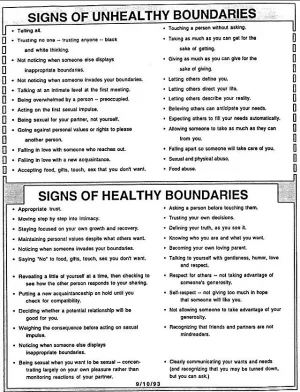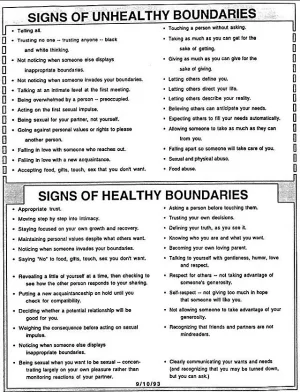People don't always weigh consequences of acting on sexual impulses, yet may still have healthy boundaries.
I suppose you're right. However, most times that I've acted on sexual impulsivity - in the physical sense, that is - I came to regret it later and wished I had exhibited more self-control. Not every time, but most times.
Concentrating largely on your own pleasure rather than monitoring the reactions of your partner. Sex is about connecting. Not accepting someone who's selfish in bed is a part of establishing boundaries. You shouldn't do things you don't want, but that doesn't mean that it must be about concentrating on your own pleasure. There's communication and pleasure on both sides. Sexual intimacy is one of those things in which it's okay to blur boundaries a little. I think this list was written by someone who has no idea that it can actually be safe to do that in a loving relationship, and how it's something that eventually makes the boundaries stronger. By letting go you can actually discover more of yourself.
I took this in a broader sense, I guess. One example for me was an incident that happened over 10 years ago. I was in what was relatively the healthiest relationship I've ever been in and my bf at the time encouraged me to surrender to another woman's sexual advances towards me in his presence, assuring me that he didn't mind one bit

. And I did - but not because I wanted
her, but because I knew how much
he would enjoy it. So, while no one did anything they didn't ultimately want to do, I for one didn't want to do it
for the right reason. I was more focused on his pleasure rather than my own, and that was indicative of my own weak boundaries at the time.
Asking a person before touching them. In some situations this may be appropriate, but if you have healthy boundaries, most of the time you're aware of the situation before asking.
Okay, yeah. I think it would be exhausting if one always had to ask someone with whom they're in a relationship if it's okay to kiss them, for example. Or to have to ask a friend or family member if it's okay to hug them every time you want to. That's unreasonable. In those types of dynamics, the permission to touch is implied. However, touching a bf/gf or even wife/husband say, when they're asleep and are unable to
not give consent is boundary-busting behavior - unless of course it's something both parties are into and have previously agreed that it's perfectly fine to do so, but that would mean the "asking a person before touching them" criterion has been met.
Not allowing someone to take advantage of your generosity. That depends on what is meant by taking advantage, but if I have healthy boundaries, I don't mind giving sometimes a little more than I perhaps should, as long as my own sense of identity and self-worth stays intact. I don't need to calculate who's expressed more kindness in a relationship
I agree that this depends on what one defines as advantage-taking. I think continuing to help someone who isn't showing a willingness or desire to help themselves and is perfectly content to keep taking from you is allowing them to take advantage of your generosity. I also agree that keeping score of who has done what for whom or how much or for how long is indeed asinine.
Putting a new acquaintanceship on hold until you check for compatibility. What? Sounds like one has to analyse the other person to make sure you're compatible. Seems neurotic to me, and not a sign of healthy boundaries.
I agree with you on this point as well. Perhaps it would have been better stated as "approaching a new acquaintanceship with caution until compatibility is established", maybe?
Also going step by step into intimacy isn't always necessary, but I addressed that earlier. Going fast may as much be a sign of a good sense of boundaries as a lack of them. You feel less the need to protect your ego when you're sure of the boundaries you have.
I stand by my previous statement on that as well: there's a difference between oversharing and cultivating intimacy at an acceptable pace. And I think the acceptable pace is whatever the individuals involved are both comfortable with.
Overall, the list does contain a lot of generalizations and some of the wording could certainly be improved upon. I appreciate your solicitous responses to this topic - it compels one to think critically where their boundaries can be more finely tuned. Healthy boundaries can change over time and from one specific relationship to another (my boundaries with a lover would be vastly different from those with my mom, for example - or one would hope

) so it's healthy to occasionally reassess them.





